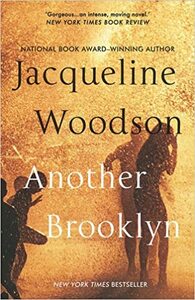You need to sign in or sign up before continuing.
Take a photo of a barcode or cover
This book, rather poem, detailed the struggles and memories of women growing up, trauma, family, and Brooklyn. The way Woodson changes from past and present and between characters was beautiful. This book flowed so effortlessly, I read it in one sitting.
Woodson's prose is compelling right from the start. This novel is quiet yet atmospheric; it engulfs you and pulls you under, but on the surface remains gentle, calm, eloquent. It's so short that it's over before you notice it's begun. Lyrical and bittersweet as the last sunset of summer.
This short coming-of-age story is a beautiful read.
August, an Ivy League-educated anthropologist, looks back at her life in Brooklyn 20 years earlier in the 1970s. She becomes friends with three other girls in her neighbourhood: Sylvia, Angela and Gigi. They form such a strong bond that at times they are almost indistinguishable.
The book examines the value and power of female friendships. The girls share “the weight of growing up Girl in Brooklyn.” Friendship gives them a sense of safety and strength: “The four of us together weren’t something [the boys] understood. They understood girls alone, folding their arms across their breasts, praying for invisibility.” Friendship allows for the sharing of confidences: “We opened our mouths and let the stories that had burned nearly to ash in our bellies finally live outside of us.” The girls encourage each other: “each one moved so that the other could continue moving.” Perhaps more than anything, friendship gives them a sense of home they do not feel elsewhere: “We saw the lost and beautiful and hungry in each of us. We saw home.”
The girls witness and/or experience poverty, broken homes, the flight of whites from the neighbourhood, drug abuse, the effects of the Vietnam War on black families, the influence of the Nation of Islam, and the dangers of predatory men.
August has “a longing to be a part of who [the other three girls] were, to link my own arm with theirs and remain that way. Forever.” When she becomes part of their circle, one of the girls tells her, “You belong to us now” and August adds, “And for so many years, it was true.” Of course the girls drift apart or are pulled or lured away, and each is left with a “deep gap.” But, nonetheless, their identities remain shaped by the friendship they shared.
The narrative has a fragmented structure. Memories are not experienced chronologically so it makes sense that the adult August’s memories move back and forth through time. The language also seems appropriate to memories. It is very lyrical and flows like one memory flows into another. I almost felt as if I should be reading the book aloud - like poetry is meant to be read.
I was fortunate to have a close-knit group of four friends when I was in high school, and I was amazed at how well the author captured the intensity, inspiration and joy of youthful friendships. The novel can be read quickly but it deserves to be read more than once.
Please check out my reader's blog (http://schatjesshelves.blogspot.ca/) and follow me on Twitter (@DCYakabuski).
August, an Ivy League-educated anthropologist, looks back at her life in Brooklyn 20 years earlier in the 1970s. She becomes friends with three other girls in her neighbourhood: Sylvia, Angela and Gigi. They form such a strong bond that at times they are almost indistinguishable.
The book examines the value and power of female friendships. The girls share “the weight of growing up Girl in Brooklyn.” Friendship gives them a sense of safety and strength: “The four of us together weren’t something [the boys] understood. They understood girls alone, folding their arms across their breasts, praying for invisibility.” Friendship allows for the sharing of confidences: “We opened our mouths and let the stories that had burned nearly to ash in our bellies finally live outside of us.” The girls encourage each other: “each one moved so that the other could continue moving.” Perhaps more than anything, friendship gives them a sense of home they do not feel elsewhere: “We saw the lost and beautiful and hungry in each of us. We saw home.”
The girls witness and/or experience poverty, broken homes, the flight of whites from the neighbourhood, drug abuse, the effects of the Vietnam War on black families, the influence of the Nation of Islam, and the dangers of predatory men.
August has “a longing to be a part of who [the other three girls] were, to link my own arm with theirs and remain that way. Forever.” When she becomes part of their circle, one of the girls tells her, “You belong to us now” and August adds, “And for so many years, it was true.” Of course the girls drift apart or are pulled or lured away, and each is left with a “deep gap.” But, nonetheless, their identities remain shaped by the friendship they shared.
The narrative has a fragmented structure. Memories are not experienced chronologically so it makes sense that the adult August’s memories move back and forth through time. The language also seems appropriate to memories. It is very lyrical and flows like one memory flows into another. I almost felt as if I should be reading the book aloud - like poetry is meant to be read.
I was fortunate to have a close-knit group of four friends when I was in high school, and I was amazed at how well the author captured the intensity, inspiration and joy of youthful friendships. The novel can be read quickly but it deserves to be read more than once.
Please check out my reader's blog (http://schatjesshelves.blogspot.ca/) and follow me on Twitter (@DCYakabuski).
I read this in one sitting, which is easy to do given the poetic nature of the prose and its abbreviated length. Beautifully written and thought provoking.
I loved this book. It's poetic, sad, and lovely. It wasn't as queer as I was hoping (I recommend reading Woodson's Red at the Bone instead if that's what you're looking for) but it felt like reading The House on Mango Street à la Summer Sisters/Sisterhood of the Traveling Pants, so I highly recommend it if you enjoy women-of-color-centering portraits of a neighborhood & female friendship.
For a short book, this story felt tremendous. I selfishly wish there was more. This is the second novel of Woodson's that I've read and I absolutely love her writing style. From the perspective of August, a woman returning home to bury her father, Woodson effortlessly flows in and out of August's memories from 1970s Brooklyn told through sparkling prose. I hold a special place in my heart for stories surrounding female friendships/siblings, and this one was just gorgeous.
emotional
reflective
sad
fast-paced
Plot or Character Driven:
A mix
Strong character development:
Complicated
Loveable characters:
Yes
Diverse cast of characters:
Yes
Flaws of characters a main focus:
N/A
At some point, all of this, everything and everyone, became memory.
Woodson's prose is refined and piercing in its ability to suggest how tragic loss, growing up, and change can be - it does so without being explicit or convoluted, and it does so in a way that I think all audiences could understand and resonate with.
Her romanticised portrait of young girls and their relationships with one another rings true - she captures the turbulent feelings of love, admiration, jealously, and hate that all girls have felt with their friends. It definitely bought up feelings of melancholy and nostalgia for my younger self and all of her friends, which I think is a testament to Woodson's ability to make this novel feel like a dream, a diary entry, a memory capsule.
Another Brooklyn is the new novel by Jacqueline Woodson, the author of Brown Girl Dreaming. At times, I find myself lost in this story and its emotions. At other times, however, I find myself focused on the structure of this very short book and lose that connection with the story itself. The book is still beautifully written and an emotional story, but it just seems to miss the intensity of Brown Girl Dreaming.
Read my complete review at http://www.memoriesfrombooks.com/2016/08/another-brooklyn.html.
Reviewed based on a publisher’s galley received through Edelweiss
Read my complete review at http://www.memoriesfrombooks.com/2016/08/another-brooklyn.html.
Reviewed based on a publisher’s galley received through Edelweiss
This was poetic, structurally, with allusions and fragments coming together to sketch a portrait of people and a place. The people remained a bit unknowable; the place -- Brooklyn in the 1970s -- was more vivid. I'm still thinking about the opening claim: "I know now that what is tragic isn't the moment. It's the memory." I'm not sure I agree -- quite a few people's stories ended tragically, and the moment was at least as terrible for them as the memory would be for those who survived.
Woodson skillfully captures the quotidian sexual assaults made on teenage girls, and how girls have to normalize and minimize them to preserve their youthful joy.
I know I should only critique the book I read, and not the one I wanted, but in some ways, this felt like the sketch for a series of much longer stories. I'm still deciding how I feel about getting only the flashes and scenes, rather than the detailed narrative of a more traditional novel. I have to admit that the overall effect was powerful, and my interest in the prose and the story never wavered. But I would have liked a bit more!
Woodson skillfully captures the quotidian sexual assaults made on teenage girls, and how girls have to normalize and minimize them to preserve their youthful joy.
I know I should only critique the book I read, and not the one I wanted, but in some ways, this felt like the sketch for a series of much longer stories. I'm still deciding how I feel about getting only the flashes and scenes, rather than the detailed narrative of a more traditional novel. I have to admit that the overall effect was powerful, and my interest in the prose and the story never wavered. But I would have liked a bit more!




